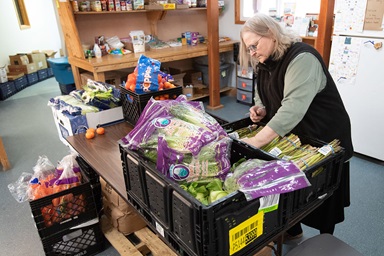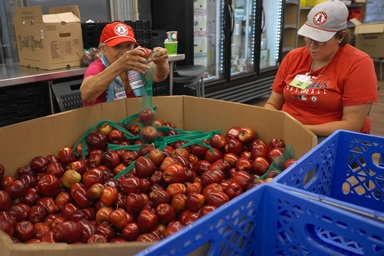If regionalization is ratified, United Methodists will need to be more intentional in maintaining connection, and one way to do that is through mission.
That was the message from three United Methodist bishops at a gathering of United Methodist Volunteers in Mission leaders from across the U.S. The bishops discussed the package of amendments to the denomination’s constitution that, if ratified, would give the denomination’s different geographic regions equal authority to adapt parts of the Book of Discipline, the denomination’s policy book.
“Regionalization is really an opportunity for the various regions of our connection to live out our mission, our theology and our polity in their context,” said Bishop Robin Dease, who leads the North Georgia and South Georgia conferences.
“Personally, I think regionalization also is another way of pulling back the layer of colonization.”
With voting still taking place, United Methodists won’t know until early November whether regionalization will take effect. To be ratified, constitutional amendments need the approval of at least two-thirds of the total annual conference voters worldwide.
One concern is that regionalization, with its greater flexibility around church policies, will harm the shared identity of United Methodists, who span four continents.
“That’s the risk — that we would become disconnected,” acknowledged Bishop Kristin Stoneking, who leads the Mountain Sky Conference. “But the opportunity is that we could lean even harder into really understanding who we are as Wesleyans and as United Methodists, and understand our faith practices, our spiritual disciplines and our history much more deeply than we do now.”
But, she added, staying connected will require intentionality.
One aspect of ministry that binds United Methodists around the globe is a shared commitment to mission. But at this point, by Discipline, United Methodist Volunteers in Mission are organized by U.S. jurisdictions.
However, United Methodists in other regions of the world are also engaged in the kind of short-term missions UMVIM supports, said the Rev. Judy Chung of the United Methodist Board of Global Ministries.
“So you visit Africa and you speak with our United Methodist brothers and sisters, they are sending volunteer teams to other parts — not only within their own annual conferences — but to their neighboring countries,” Chung, who is the agency’s executive director of missionary service, told those gathered. “They just may not call it UMVIM, but there is active volunteer movement in those regions as well.”
She sees an opportunity for these volunteer movements to operate under a shared umbrella at some point.
Bishop David Bard, who leads the Michigan Conference and co-leads the Illinois Great Rivers Conference, described some of the theological grounding of regionalization.
One is the belief that the Holy Spirit is present in each follower of Jesus.
“That doesn’t mean that someone might not be wiser about something than another person,” he said. “But it does mean, I think, that we all have wisdom, and we need to pay attention to that wisdom and to our context.”
Another theological idea that supports regionalization originates in the Roman Catholic Church. That is subsidiarity — the principle that decisions should be made closest to the people whom they affect.
“The opportunity in regionalization is that we will find new ways to be connected in mission and ministry, that that will be the thing that keeps us working together,” Bard said.
“We are not going to all think alike across the globe as United Methodists. Hopefully, there’ll be enough of a family resemblance so that we’ll recognize one another. But if we want to make this work and be a lively form of the church, we will need to find new ways to connect with one another in mission.”
Back to main story:
Volunteers in Mission embark on new chapter
Hahn is assistant news editor for UM News. Contact her at (615) 742-5470 or newsdesk@umcom.org. To read more United Methodist news, subscribe to the free UM News Digest.




